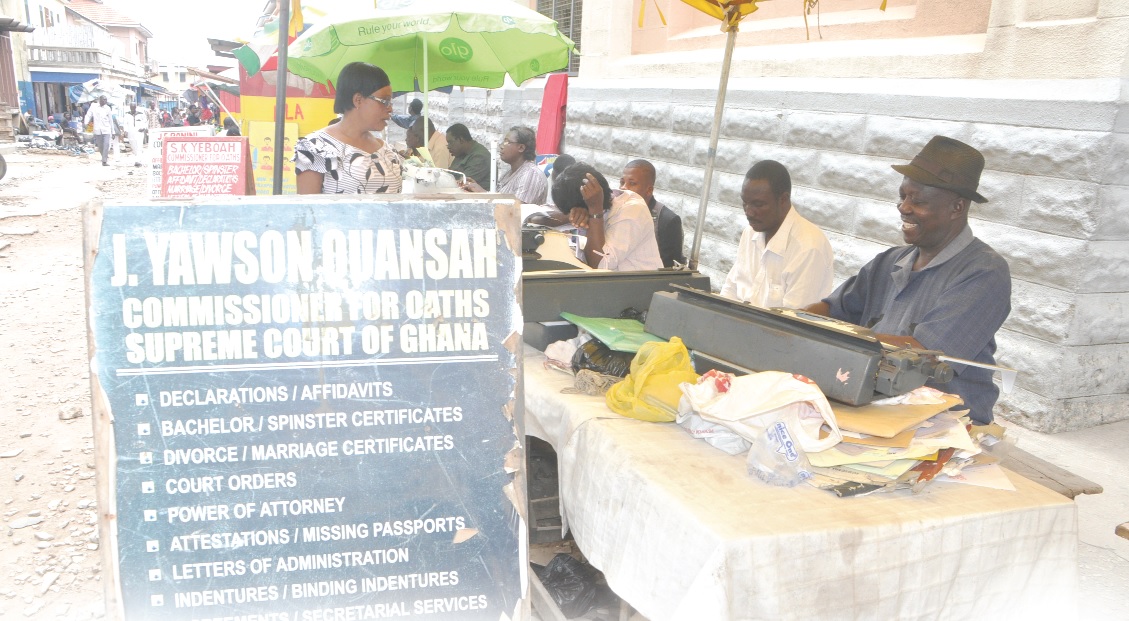Commissioners for Oaths at work
 To think that in this modern world in which technology rules and the computer has influenced the way we do things, a certain crop of people will still cling to the old ways of doing things is amazing.
To think that in this modern world in which technology rules and the computer has influenced the way we do things, a certain crop of people will still cling to the old ways of doing things is amazing.
Yet that is exactly how most of them choose to go about their business as they strike the keys of their manual typewriters, amid clattering sounds and their fingers blackened from contact with carbon paper.
They are called commissioners for oaths and they are mostly found at post offices, on court premises, and in Accra, around the Ghana Publishing Company Head Office in Accra and at the Registrar-General’s Department.
This is not too surprising, because their job is to administer oaths and take and receive affidavits, statutory declarations and affirmations.
They can also certify true copies of documents. And these locations are places where their services are most needed.
A document used for court cases and other legal proceedings must be sworn or affirmed in front of a commissioner for oaths or a Notary Public in order to be admitted as evidence.
Lawyers who are notaries public can also administer oaths, take and receive affidavits, statutory declarations and affirmations.
A Notary Public can also certify true copies of documents.
However, it is important to stress that not all lawyers are Notary Public.
If you have to do a change of name, it is a commissioner for oaths you need to effect this change.
To produce a document to show that you are married, divorced, a bachelor or spinster, a commissioner for oaths comes in handy.
But why do most commissioners for oaths prefer to use their old typewriters instead of computers and other secretarial gadgets that could enhance their work?
Is this profession exclusively reserved for those advanced in age?
Mr James Yawson Quansah, a Commissioner for Oaths who operates on the premises of the Accra General Post Office, provided some insights into his work.
Mr Quansah is 63 and has been working as a commissioner for oaths for about five years.
His office consists of a table on which his typewriter and documents sit, his chair, a bench for clients and, importantly, an umbrella over his head to provide him some shade from the sometimes scorching sun.
He sits in a row at the side of the Accra General post office with more than 10 other commissioners.
As I approached, a number of them beckoned me to their “office”, ready to offer their services.
Asked why he still used the manual typewriter, Mr Yawson laughed and said, “We don’t have a power source here.”
He explained that because of the way clients sometimes needed documents instantly, the typewriter would remain a preferred choice for a long time to come because it was always ready for use; no need to plug it into a power source. Also, in the event of power outages, typewriters are not affected.
But Mr Quansah claimed he had a computer at home.
“When some clients need work to be done on the computer, I take the work home, but that means they cannot have their documents instantly,” he explained.
Asked what qualified him to be a commissioner for oaths, he said he had worked as a licensed letter writer for 15 years and worked as a court registrar for a long time before retirement.
He had also worked in a lawyer’s chambers for some time.
He had to acquire a licence for a fee at the High Court and was sworn in as a commissioner at the Supreme Court after attending an interview.
“Most of us here have worked as court bailiffs, worked in some lawyers’ chambers and know a little bit of law,” he said.
“Sometimes we act as ‘first aid givers’; clients first come to see us for legal advice and when what they want done is beyond us, we refer them to lawyers,” he added.
Mr Quansah said the ordinary Ghanaian felt more comfortable using the services of commissioners for oaths for a number of reasons.
“We are down to earth, you don’t need to pay to consult us and you just pay a very small fee for the work we do,” he said.
For his services, clients pay between GH¢2 and GH¢20.
On a good day, Mr Quansah makes about GH¢60.
He enjoys his work because, as he put it, “It is interesting and puts bread on my table.”
But the critical question still remains whether there is any linkage between the age of commissioners for oaths and their reluctance to use computers.
The general perception is that people in a certain age group are referred to as BBC — Born Before Computers — and would always advance excuses as to why they would not use the computer.
Computers or not, our commissioners for oaths are serving a key social need and they will remain relevant to our developmental efforts for a long time to come.
By Doreen Hammond/Daily Graphic/Ghana
Writer’s Email: [email protected]
